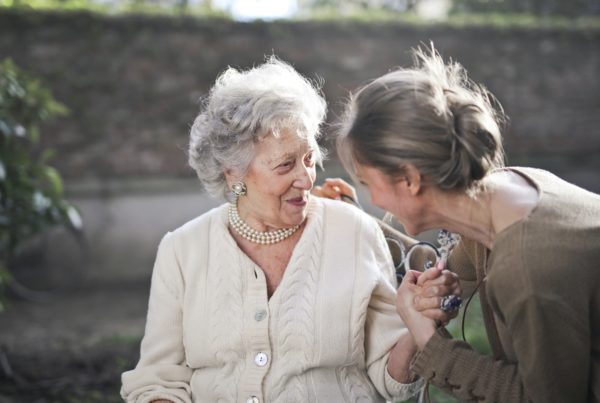by Robin Dynes
When your relative ages there is a danger that they will become lonely and isolated. This will have a damaging effect on their health and wellbeing. The risk is multiplied if they are struggling with dementia. A survey by Alzheimer’s Society in 2013 found that 38% of people with dementia felt lonely. This rises to 62% when the person lives alone. Loneliness can lead both to depression and an early death.
On top of the normal factors which isolate elders such as lack of transport or general bad health, when your relative has dementia they may start giving up on previously enjoyed hobbies and socialising because they:
- Have lost confidence in being able to independently arrange events or take part in activities
- Struggle with communicating. They stop initiating conversations and have trouble sustaining them. Other people, because of the extra effort needed, can stop talking to them.
- Are concerned over how other people perceive them – seeing them as different and taking pity on them. They may also be influenced by the stigma attached to dementia.
- Have memory problems – they need to write everything down in order to remember or keep track of things. This makes them feel embarrassed and inadequate.
- Lack energy and motivation
- No longer manage well with technology, talking on the phone, using a computer or a smart phone.
What can you do about it? Here are a few suggestions:
Help maintain existing relationships
Contact may be lost because of lack of transport – to visit friends, meet for coffee, go on an outing or attend an activity group. Think about how you might help them maintain connections. Could you encourage relatives or friends to phone or visit them at regular intervals or take them out for coffee? Might you, another relative, a volunteer or a paid carer, arrange or accompany them on a visit to a friend, an event or attend a class? Would it be possible to occasionally arrange small social gatherings of their friends or relatives? Might they be able to keep contact if you helping them email, send a card or write a letter to a friend?
Making new social connections
My mother said that one of the worst things about living longer than everyone else was not health problems but the loss of lifelong friends. We all need to replace friends who are no longer here or have moved on. The principal way we all do this is by joining groups which offer something which has meaning for us. This might be by learning, a shared interest, a health focus such as an exercise class or a support group. Perhaps your loved one might like to try joining a group that interests them such as:
- A local community choir.
- Going to services or activities at their place of worship.
- A dance, tai chi or relaxation class
- A community gardening group
- A coffee morning, bingo or a walking group
Be imaginative. Look out for what is happening in your area. Local authorities and charities may provide day, or drop-in centres for older people which offer a range of activities. The University of the Third Age (U3A) run lots of groups in most areas. You may have to try out a few opportunities before you find one that suits your relative. Once your loved one has joined a group that they like, another member may be happy to pick them up or befriend them at the event. Places of worship are especially good for this.
Search around and make enquiries. Different areas have different initiatives. For example; The Dorset Befriending Service is run by the Royal Voluntary Service and offers home visiting and support to older people across Dorset. (www.royalvoluntaryservice.org.uk/hubs/1271-dorset+and+wiltshire)This includes trips out, accompanied walks, shopping and socialising. Age UK Coventry (www.ageukcoventry.org.uk) runs a Dementia Friendship Scheme for people with early stage dementia which aims to support people who live alone maintain a hobby or activity within their local community. In Leicester, Learning for the Fourth Age (www.l4a.org.uk), provides learning opportunities to older people receiving care. There will probably be similar initiatives within your area.
Address other health issues
Your relative may be reluctant to go out or take part in social events because of issues other than memory or fear of getting lost. For example, they may have incontinence, sight or hearing problems. Try to draw out what the issues are and address them. Medications and incontinence supplies, new spectacles or hearing aids may help.
Encourage eating with other people
Eating with others is inherently a social activity. It is almost always, unless you live on your own, a shared event. It is a time for sharing and discussion between families, friends and strangers. Dining with others is also more likely to promote better nutrition – often a problem with the elderly. Encourage your relative to eat with others as often as possible. This might be with a lunch group, at a day or community centre, a friendly café or a local supermarket. Short interactions such as ordering tea, speaking to a waiter and sitting with other people will help them feel more connected.
Arrange face-to-face interactions
This is often difficult if family members don’t live near to your relative. Regular contact be phone, email or Skype is important for those who are able to use technology but don’t neglect face-to-face interaction. The Alzheimer’s Society report on loneliness found that more than one in ten people spoke to friends or family face-to-face less than once a fortnight. Face –to-face contact is important, as these conversations provide both visual and sensory clues which can help form memories more easily. That physical contact, a kiss on the cheek, a reassuring hug or even a disagreement is so much more effective in breaking the sense of loneliness and isolation. If your relative is difficult, keep the visits brief but make them regular.
Organise special events your relative will enjoy
This might be outings to concerts, theatre, cinema, festivals, talks, charity fund raising events, art and craft exhibitions, dog shows, etc. If you or other family members are unable to go with them perhaps you can arrange for a paid carer or a community volunteer to accompany them. They will then do things they would not be able to do alone. Think about what they have done in the past and do some research. Offer to get any necessary tickets and arrange transport.
Consider arranging for a professional carer to check on your relative at regular intervals
This is especially useful if you live far away or are unable to visit regularly yourself. Carers will be experienced in meeting the needs of people who are isolated because of different health problems. They will be able to match your relative’s needs to community resources, find activities and accompany them if you are unable to go. They will also be able to make sure they are looking after themselves and eating properly.
Lesbian, Gay, Bisexual and Trans older people (LGBT)
Loneliness and isolation can be particularly acute in this area. If your relative is in this group they may wish to maintain or develop connections with other LGBT people. Or they may prefer to access mainstream provision that is sensitive to their needs. The limited evidence available shows that this can still be problematic and many lack confidence that mainstream services will meet their needs. You will need to take this into account when organising support and social activities. Services such as Opening Doors London (http://openingdoorslondon.org.uk/ ) run by Age UK Camden or Age UK Tunbridge Wells (https://www.ageuk.org.uk/tunbridgewells/more-services/out-and-about-lgbt-befriending/ ) are being developed in different parts of the country. Be led by the wishes of your relative. Some 41% of Lesbian, Gay and Bisexual people who are over 55 live alone.
Help them maintain a routine which includes socialising
A good way to do this is to assist the person to work out a plan for each day of the week. Depending on their retained abilities, this might be in a page a day diary or on separate sheets, one for each day of the week. This plan should be kept as simple as possible and include all the main things they do. Times can be included, if necessary. It is the quality of each day that matters, not the quantity of things they do. A typical day might look like this:
Morning
- Have breakfast – cereal, tea and toast – feed cat and get ready to go out
- Go to sing-a-long group with Janine (Paid carer)
- Have lunch in the Church café
Afternoon
- Have a nap or relax listening to music
- Deadhead and water the plants
- Have a coffee break
- Ring my friend Doris for a chat
- Feed the cat, prepare and eat my evening meal
Evening
- Watch TV – The One Show, EastEnders and Holby City
- Continue knitting baby jumper for charity
- Make a chocolate drink, take tablets and go to bed
Having a plan like this ensures the person with dementia has their basic needs taken care of and has stimulating and meaningful activities to do each day. You can see that they are having regular social contact with others to combat feelings of isolation and loneliness. Once the initial pattern is established for each week, it is quick and easy to do. Only minor changes are needed from time to time. If necessary, the daily routine can also be written on a dry-wipe activity board and displayed in a prominent place.
People with dementia often feel that that they are losing control which is frightening. Having a daily plan and routine that that they can see or look at is reassuring.
Promote understanding
Some of your family members and your loved one’s friends may avoid visiting them or getting involved because they do not know what to say or how to react to someone with dementia. The best way to make others feel comfortable is to educate them about the illness so they know what to expect and what to talk about. Once they understand most people are only too happy to contribute to the wellbeing of friends or relatives.
Watching someone you care about become lonely and isolated is painful. Helping them retain social contacts as much as possible will not only enhance their wellbeing and quality of life but will assist them in fighting the advance of the condition. It will also make your task as their carer easier and more satisfying.




